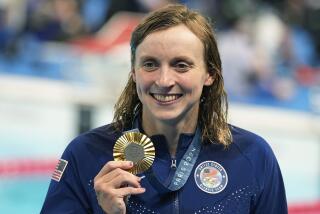Evans Wins, but Can’t Catch Her Past : Swimming: She easily wins the 1,500-meter freestyle, but can’t break the world record of 15:52.10 she set in 1988.
- Share via
FEDERAL WAY, Wash. — Janet Evans completed her Pretty Goodwill Games with another failed rush in the water and another second place at the wall.
Monday night, she raced against herself.
And lost.
The winner, two years younger and a few pounds lighter, was the Janet Evans of 1988, who went down to Orlando, Fla., and became the first female swimmer to break the 16-minute mark in the 1,500-meter freestyle. The world record she set then--15:52.10--was again the pacesetter Monday, with nobody else in the pool near Evans and nothing else on her mind except those elusive numbers.
But for the present, the past was too fast. Evans charged hard and touched at 15:54.23. It was the second-fastest time ever by a woman.
For Evans, it was a letdown.
“I’m a little disappointed,” Evans said. “To go under 16 minutes and then not break it.”
She smirked and she shrugged.
“Oh, well.”
That pretty much summarizes Evans’ pool revue at the Goodwell Games. She won three gold medals, but broke no world records. Her winning time in the 800-freestyle Friday was more than 12 seconds off her personal best. And, in the boldest headline news so far out of Seattle, she lost the 400-meter individual medley Saturday to fellow Californian Summer Sanders--Evans’ first second-place showing in a specialty event since 1987.
“I’m really looking forward to Austin,” Evans said more than once during her postrace interview session, referring to the site of this weekend’s U.S. Long Course National Championships.
“I think I can swim faster than I did here.”
Evans offered no excuses, although she was given the chance. Asked if she was tired after swimming five races, including a relay, in four days, Evans shook her head. “I could’ve been more tired,” she said. “Usually, in meets like the world championships and the nationals, you have to swim prelims and finals--and you do that for four or five days straight.
“Here, it’s only finals.”
Evans said Monday’s race salvaged the meet for her.
“I got better as the meet went on,” she said. “That makes me happy.”
Evans has been better before, but 15:54.23 isn’t bad considering she hadn’t swum 1,500 meters competitively in two years. There is no 1,500-meter event for women in international competition.
“We train for it every couple of weeks by swimming three 500s,” Evans said. But this is the first time I’ve shaved and tapered for 1,500 meters since March of ’88.”
With so much lag time between competitions, Evans tries to keep strategy simple.
“I take it out right away,” she said, which is another way to say she starts fast. “If I take it out slow, that kind of sets the pace for me the whole race.
“Today, I just knew I had to come out fast and try to go through the whole race fast. So I did.
“Almost.”
With 100 meters to go, Evans knew she had a shot at the record. She could tell by the ringing in her ears. A packed King County Aquatics Center roared as she closed down the stretch, keeping time with each stroke and each kick.
“That always helps,” Evans said.
Evans’ closest competition came from Australia’s Haley Lewis, who finished almost 18 seconds behind at 16:12.22. Evans beat the last swimmer in the pool, Yana Shamarova of the Soviet Union (17:21.86), by more than 1 1/2 minutes.
Richard Quick, Evans’ coach at Stanford and a coach of the U.S. national team, declared his pupil’s final run a great race and made note of Sanders, who won her second gold medal with a time of 2:14.06 in the 200-meter individual medley Monday.
“Summer has established herself as one of the top swimmers in the world,” Quick said, “and I don’t think there’s any doubt (Evans) has been a role model. She’s been a role model for the whole world.
“She has brought the work ethic to women’s swimming. No, you’re not beaten before you step in the pool. You see a little girl like that go against bigger, stronger women and she still comes out on top.
“Her (Olympic) victories in 1988 had a profound effect on swimming in the United States.”
Even if Evans didn’t have a profound effect on these Goodwill Games, she will always have that.
More to Read
Go beyond the scoreboard
Get the latest on L.A.'s teams in the daily Sports Report newsletter.
You may occasionally receive promotional content from the Los Angeles Times.






